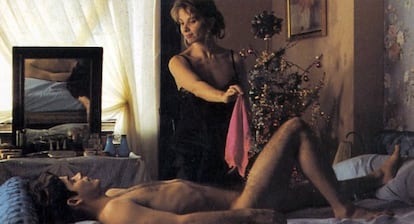Filmmaker Vicente Aranda dies at 88
Barcelona-born director made 25 features, including 1991’s ‘Amantes’

Vicente Aranda, the Spanish director who showed a bitter, realist, ironic and magnificent vision of life and of Spain in films such as 1991 hit Amantes, has died in Madrid at the age of 88, the Spanish Film Academy has announced.
Born in Barcelona on November 9, 1926, Aranda was the director of 25 feature films as well as a number of notable television works. Father to two daughters, he went on watching two or three films a day until the end, always saying that working was the thing he liked above all else.
Aranda always felt that he had been given 15 more years than those allotted to him, no doubt because he did not begin his film career until the age of 35, much later than most directors of his generation.
Sex interests me; of that you can be sure,” Aranda once told an interviewer
Aranda started out as part of the avant-garde Barcelona School with works such as Fata Morgana (1965), before using the new creative freedoms brought by the death of Franco to make the likes of transsexual drama Change of Sex (1976), which marked his first collaboration with actress Victoria Abril; Fanny Pelopaja (1984); and Amantes (1991). The films often featured unhappy characters who found liberation through sex: “Unhappiness can be more creative, more enriching,” he once told an interviewer.
Awarded Spain’s National Cinema Prize in 1988, his career was a mixture of missteps and big hits, such as the acid tales of romance he portrayed in Turkish Passion (1994), Celos (1999) and Juana la loca (2001).
Often inspired by novels – especially those by Juan Marsé but also Manuel Vázquez Montalbán, Antonio Gala and Fernando Delgado – as well as classics such as Carmen (2003) and Tirante el blanco (2006), Aranda managed to make the texts his own, inserting touches of humor that belied his apparently shy and grouchy character. “It’s something that comes with age,” he used to say.

As for his perceived obsession with sex, he always sarcastically told interviewers: “Sex interests me; of that you can be sure.”
Based on a real-life crime that occurred in Madrid in the 1940s, his 1991 hit Amantes starred Victoria Abril, Jorge Sanz and Maribel Verdú and won him Best Film and Best Director Goya Awards, as well as prizes at several international festivals. “The story was born out of a script written by Álvaro del Amo and Carlos Pérez Merinero, which I later turned over myself many times,” Aranda said at the time. “The real events took place in 1949, but I set it in 1956 because the backdrop is not the postwar period, but rather a love story that could take place right now.”
Among his other notable works are The Exquisite Cadaver (1969), The Blood Spattered Bride (1972) – which US filmmaker Quentin Tarantino once cited as an influence – Clara Is the Price (1974), Murder in the Central Committee (1982), Libertarias (1996), Juana la Loca (2001) and Carmen (2003).
Quentin Tarantino once cited Aranda’s The Blood Spattered Bride as an influence
In 2007 he made Lolita’s Club, his fourth adaptation of a Juan Marsé novel, which saw him come into conflict with the author, who accused him of fixating on the scatological and erotic aspects of his works. “The erotic, yes; the scatological, no,” Aranda replied.
His last film was 2009’s Luna caliente, which featured Eduard Fernández.
Director and writer Manuel Gutiérrez Aragón said Aranda was a multi-faceted filmmaker. “He made many types of cinema, very varied. He started making very modern films, such as Fanny Pelopaja and The Blood Spattered Bride, titles in which he portrays Barcelona at its most modern, but later directed [the period pieces] Amantes and Libertarias.
“As a director I very much admire the variety of the topics he tackled, films with a strong erotic and historical sense. The film of his that I most like is without doubt Amantes, but Libertarias also interested me, though it was a big commercial failure. He was a very rigorous director when it came to staging and directing acts – a rigor that you appreciate now more than ever. Today I remember the comments he always made to me about getting out of Barcelona, horrified by Catalan nationalism. He got out of there terrified, shaking the dust off his shoes.”
Tu suscripción se está usando en otro dispositivo
¿Quieres añadir otro usuario a tu suscripción?
Si continúas leyendo en este dispositivo, no se podrá leer en el otro.
FlechaTu suscripción se está usando en otro dispositivo y solo puedes acceder a EL PAÍS desde un dispositivo a la vez.
Si quieres compartir tu cuenta, cambia tu suscripción a la modalidad Premium, así podrás añadir otro usuario. Cada uno accederá con su propia cuenta de email, lo que os permitirá personalizar vuestra experiencia en EL PAÍS.
¿Tienes una suscripción de empresa? Accede aquí para contratar más cuentas.
En el caso de no saber quién está usando tu cuenta, te recomendamos cambiar tu contraseña aquí.
Si decides continuar compartiendo tu cuenta, este mensaje se mostrará en tu dispositivo y en el de la otra persona que está usando tu cuenta de forma indefinida, afectando a tu experiencia de lectura. Puedes consultar aquí los términos y condiciones de la suscripción digital.








































